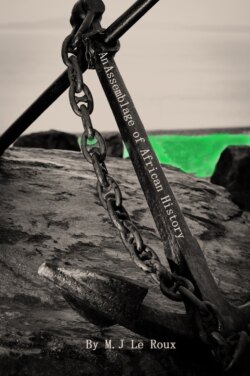Assemblage of African History

Реклама. ООО «ЛитРес», ИНН: 7719571260.
Оглавление
Micqel Le Roux. Assemblage of African History
DEDICATION
ABSTRACT
PREFACE. Variis temporis momentum dilatationis et differentias
ACKNOWLEDGEMENTS
CHAPTER 1 - Oral Tradition. Oral tradition: Different perspectives and methods to re-build African history in context
CHAPTER 2 - The Dutch East Indian Company. The Dutch East Indian Company & The Cape of Good Hope:
The Refreshment station:
The cape as a refreshment station;
Refreshment station to Colony:
Transhumant pastoralism:
CHAPTER 3 - The influence and spread of Islam in North and Sub Sahara Africa. Religion in an African context
Education and Philosophy
Trade and commerce
CHAPTER 4 - Southern Africa. Cape Town during the 19th century
The incident involving Ndlambe:
Ordinance 50 of 1828
The decline of the Xhosa political and economic power during 1834 and 1857:
The Combination of the Roman-Dutch laws and English laws during the 1800s:
CHAPTER 5 - Napoleon in Egypt
CHAPTER 6 - The early 19th century schism. Julian Cobbing’s argument regarding the events of the early 19th century commonly known as Mfecane
John Wright’s contribution to the ‘Mfecane debate’
CHAPTER 7 - The Great Trek. Was the great trek a land-grabbing exercise that brought misery to the blacks of South Africa?
CHAPTER 8 - Africans enslaved abroad. The United States of America, Democracy & Slavery
CHAPTER 9 - Indigenous groups of Southern Africa. Strategies – The Survival of the San
Khoekhoe: The political organization
An economical shift from the late to the mixed farming period
Archaeological research findings for historians in Africa:
Αδύνατο [Impossible] story of Africa – The history of Africa, is it possible?
CHAPTER 10 - Congo. Congo Africa
The impact on the Congo:
CHAPTER 11 - Monogamy; a Complicated cultural relationship. Boers, Pedi. Swazi & British engagements during the 1800s
REFERENCES
Отрывок из книги
An assemblage of African history entails different perspectives and insights into different histories of Africa and abroad. It comprises of different occurrences within Africa, interlinked with different geographical and historical spheres and promotes certain perspectives and questions. Furthermore one can expect to find different settings and occurrences within the context of history applied to Africa. An assemblage of African history stretches from the Cape to Cairo and entertains different scenarios throughout history.
It is in these historical replications and investigation that an abstract thought can act as a memoir. Therefore, if this premise were to be entertained, can one indulge a theoretical analogy that there is a psychological or even empirical (conditioned genetic[1]) subliminal contributor to the human; a condition which can substantiate the idea that segregation, racism and division within today's societal constructs are compelled and conditioned throughout different cultures in conjunction with human nature that promulgated over time to act on an innate nature with the direct affiliation of the immediate nurtured environment? What we once considered a complicated relationship between the cultural relationships; can executively be described as a conditioned response to the difference of social context that has been promoted throughout history into our genetic aspect that has been promoted by environmental manipulation.
.....
A clear example could be feedback from an isiXhosa group that the male circumcision could be part of the traditions of the 10 lost tribes of Israel and that the ancestry trace back to them (note; this is an example of misconception and should not be acknowledged). This is merely an example of how easily someone can misinterpret information or make unsubstantiated conclusions, but rather speculating and using that information as substantiated evidence. Thus, it is important to look at oral tradition with respect and a critical eye, hence testing this evidence against different methods and in-depth research, furthermore applying the scientific method.
In conclusion, we can see that every method has its advantages and disadvantages. Therefore oral tradition has merit in reconstructing the history of pre-colonial Africa, but only to some extent. There should be an empirical and holistically combined approach (utilizing archaeology and linguistics etc.) as evidence to substantiate any claims. Therefore thorough investigations should be the pinnacle means of operation and information retrieval. Oral tradition could be seen as an insightful reconstruction tool and should be viewed critically. If historians apply necessary prompts and procedure methods and avoid errors like that of clichés and myths of origin the psychology of oral tradition could be proven useful and insightful to build a more detailed picture of ancient Africa.
.....